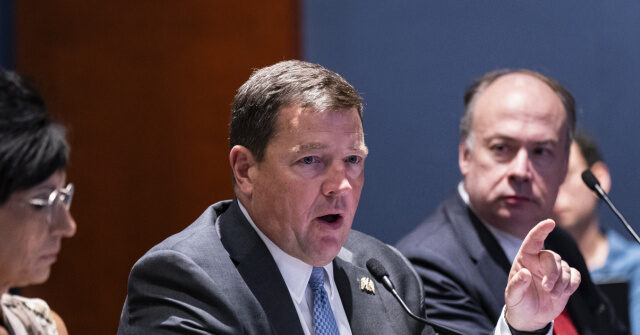The Office of Management and Budget (OMB) plays a crucial role in the administration’s function and efficiency, particularly concerning the Department of Government Efficiency (DOGE) cuts. Ed Martin, the new chief of staff at OMB and president of Phyllis Schlafly Eagles, discussed the importance of this office during his recent interview on Breitbart News Daily. Martin emphasized how the role of OMB has evolved over the last century, detailing that its responsibilities now encompass a much larger scope due to the expanding size of government. He characterized OMB as the “back office” of the President’s administration, highlighting its responsibilities in managing federal budgets, resource allocation, and policy implementation. This expanded role is crucial for ensuring that government departments are adequately funded and run efficiently, allowing for corrective measures in response to poor financial decisions.
Martin introduced Russell Vought, the Director of OMB, as a pivotal figure in this operation, particularly given his experience during the Trump administration. Martin praised Vought as a smart conservative who comprehends the broader implications of governmental operations. With Vought at the helm, OMB not only oversees the federal budget but also serves as a critical player in any major reform initiatives, including the current collaboration with Elon Musk and Vivek Ramaswamy on the DOGE initiative. Martin explained that while transformative discussions around government reforms often take place outside official channels, tangible changes require coordination within OMB, where deregulation processes are meticulously managed.
The DOGE initiative, led by Musk and Ramaswamy, aims to fundamentally reform government efficiency. According to Martin, rather than seeking leadership roles in specific departments, Musk and Ramaswamy opted to focus on comprehensive governmental restructuring. Their strategic approach emphasizes the financial authority that OMB possesses over government spending, asserting that leveraging budgetary control is key to influencing departmental behavior effectively. For instance, Martin mentioned USAID, a department spending substantial amounts of taxpayer money, which might operate in ways inconsistent with national interests. OMB holds the power to withhold funding until the department aligns its operations with the President’s objectives.
Reflecting on the initial skepticism regarding the DOGE initiative, Martin recounted that he viewed it as unrealistic just six months prior. However, he has since acknowledged the potential for significant reform now that key players understand how to navigate the system’s complexities. Martin believes that both Musk and Ramaswamy possess the expertise to harness the necessary tools to effectuate change, collaborating closely with OMB to enact practical governmental reforms. This partnership underscores a dual strategy: utilizing Musk’s media reach and influence while applying OMB’s operational capabilities to initiate effective reforms.
Martin’s statements emphasize a cautious optimism regarding the evolving nature of government reform. He argues that traditional governmental inertia often overwhelms reform efforts; however, with strategic initiatives like DOGE, opportunities to effect systemic change seem more attainable. He suggests that the combination of Musk’s innovative perspectives and OMB’s managerial expertise creates a fertile ground for reform implementation, one that could reevaluate and potentially reshape ineffective government practices. The partnership seeks proactive engagement with federal agencies to guarantee that taxpayer money is spent effectively and aligned with the administration’s priorities.
In conclusion, the collaboration between OMB and the DOGE initiative signifies a transformative moment in U.S. governance. With influential leaders like Martin, Vought, Musk, and Ramaswamy at the forefront, there is a renewed focus on streamlining government efficiency and accountability. As these initiatives gain momentum, the ability of OMB to influence policy, budget, and regulatory approaches will be essential to achieving sustained changes. Overall, the ongoing dialogue around the renaissance of OMB and the DOGE initiative represents a critical examination of how government can better serve its citizens by reforming its approach to efficiency and fiscal responsibility.

